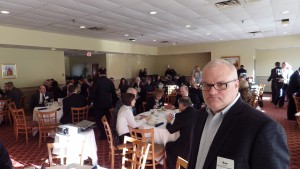Business and the economy intersect at Shelton event
A recent breakfast at the Brownson Country Club in Shelton featured a piping-hot buffet of scrambled eggs, waffles and hash browns. For the main course, the 128 attendees took in a data-packed menu of presentations from industry leaders in hospital administration, tech manufacturing and auto sales and from an economist, Peter Gioia of the Connecticut Business and Industry Association.
The event was the Greater Valley Chamber of Commerce Economic Outlook 2016.
Gioia, who is also CBIA vice president, said, “This is a critical year in Hartford. It is essential they get their fiscal house in order.” On the plus side he noted the collapse of oil prices “adds $1,000 in purchasing power to every family in the U.S.” while natural gas pipelines now heading to Connecticut from Pennsylvania”™s Marcellus Shale deposit will arrive in two to three years.
“We”™ve always been at the end of the pipeline for natural gas,” Gioia said. “Now we”™ll have access to the cheapest natural gas on the planet. There will be enormous pressure to spiderweb plants off those pipelines. If you”™re along one of those pipelines, you could build steel in Connecticut.”
Gioia also said, “ISIS and China we can”™t control. But we can control what happens in the state. Right now, our policy has been to load the shotgun, point it at our feet and pull the trigger.” It was a point echoed several times by others.
Representing 270 new car dealerships in the state and the 14,000 directly related jobs that he said come with them, James Fleming, president of the Greater Hartford Automobile Dealers Foundation, said, “Auto dealers are not going anywhere.” Their average-salaried workers at $60,000 per year, he said, are “very community oriented.” Dealerships, he noted, are often deep-rooted multigenerational family companies.
But Fleming also said dealers are bedeviled by credit issues, taxes and regulations that include a $50,000 classification for luxury cars, which are taxed higher than other cars. He said buyers of true luxury cars ”“ those priced above $100,000 ”“ typically skirt the tax by buying their luxe vehicles in other states.
Fleming also said, “The auto industry is back.” He said in-state dealers expect to sell $10 billion worth of cars this year, compared with $6 billion during the recession seven years ago. “We want to keep this industry healthy,” he said. “We are as big as some of the largest corporations in Connecticut.”
Russ Hayden is president of Electri-Cable Assemblies in Shelton, a company with 25 patents for manufacturing its tech consoles for office furniture. In the 10 years he and two partners have owned the company, it has grown from 35 to more than 120 employees. Local to his core and tieless by practice, he said, “If I showed up at my customers with a tie on they”™d throw me out.” Those clients include Mohegan Sun, GE, Gateway Community College in New Haven, the University of Michigan and St. Joseph”™s High School in Trumbull.
Hayden said he faces challenges on fronts that include safety and a health insurance bill up 22 percent this year. “That law is a train wreck,” he said of the Affordable Care Act.
“Connecticut is 1.4 percent of the business that I ship, which tells me growth is slow,” Hayden said. Still, he noted company sales were up 12 percent in 2013, 29 percent in 2014, 34 percent last year and are expected to rise 20 percent this year. He added 9,000 square feet to his operations in Shelton last year. He cited the need for budget predictability and stability in Hartford. He raised the topic of family leave, saying, “Let me decide how to handle employees who need time off.”
Griffin Hospital in Derby has remained independent as many hospitals are forming networks. Patrick Charmel, its president and CEO, likes it that way, saying it has led to better care ratings. He said the U.S. is witnessing a new paradigm for health care. In the past, he said, you waited until you got sick and then the health system entered the picture. Now, the incentives are to keep you healthy.
Calling it “a little secret,” Charmel said, “We incentivized the wait to get sick. The sicker the better and then when they show up we do as much for them as we can, whether they need it or not. Now we need to incentivize ways to get healthy.” He said since the ACA arrived, “In three years we”™ve had the slowest growth in the last 30 years.”
Shelton Mayor Mark Lauretti, who has served in that office since 1991, said his administration”™s policies have been conducive to business and have made businesses want to grow locally. “Shelton has been that place,” he said. “As a business owner you need stability and predictability. Seniors, too, need stability and predictability. These things affect all of us. If you don”™t have your financial health, you”™re no good to anybody.”
Albert Paolozzi, vice president and senior market manager for event co-sponsor People”™s United Bank, offered springtime optimism ”“ “Pitchers and catchers have reported” ”“ and a policy of listening at People”™s United. “The greatest story ever told is yours,” he said. “It”™s about hearing and working with compassion.” The other event co-sponsor was tax and accounting firm BlumShapiro, represented by partner Thomas Walsh Jr.
Walsh referenced the importance of teamwork. He noted to the networking-savvy audience that teamwork can extend to baseball; he coaches Paolozzi”™s son.
